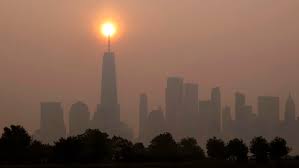Podcast: Play in new window | Download
Subscribe: RSS

Canadian wildfires this spring made the air unhealthy not only here in Toronto, but across the midwestern and northeastern United Stets.
Acrid smoke from unrestrained wildfires burning in remote Canadian forests this spring and summer has repeatedly fouled the air and dimmed the sun in vast swaths of the US Northeast and Midwest. Because of it, for a time the air quality in New York City was the worst of any city in the world.
Meanwhile the entire Southern US is locked in a heat wave of unprecedented severity and length, with the entire area seeing prolonged temperatures above 100 degrees Fahrenheit and as high as 120 degrees. This weekend, one-third of the US population is under extreme-heat advisories. In south Florida, forecasters predicted even less rain and hotter temperatures because of the infiltration of dust in the air — dust blowing in from the Sahara Desert in Africa!
The water temperatures in the Gulf of Mexico and southern Atlantic are hotter than they have ever been, with Key West waters topping 96 degrees Fahrenheit, which is just a few degrees short of the normal temperature for a hot tub. Any hurricane entering such energy-rich water is going to go immediately to afterburners, and forecasters are predicting a more active than usual hurricane season.
A recent study found that storms doing over a billion dollars’ worth of damage in the US in 2008 occurred on average once every 80 days. Back then these storms inflicted damage of a billion dollars and change [costs adjusted for inflation]. Today they occur on average every 18 days, and usually involve many billions of dollars of damage. Hurricane Ian’s cost for example is estimated at $113 billion. In the recent debates about federal spending and the debt ceiling, there was no mention of this vast, unprecedented and growing need for astronomical amounts of federal money for disaster relief.
This week Farmers Insurance became the fourth property-insurance company to withdraw entirely from the hurricane-ravaged state of Florida, joining 15 insurers that are not accepting any new business, seven that have been declared insolvent and 18 that are so fragile they are on the state regulator’s watch list. Similarly, the largest, and the fourth largest, property insurers in California have withdrawn from that state, unable to keep pace with its raging wildfires.
At the same time, in the same country, torrential rains caused catastrophic flooding throughout New England and the Northeast in the second week in July, destroying roads, displacing thousands of people and submerging towns and cities such as Vermont’s capital city of Montpelier.
Small wonder then that a committee of Congress was eager to hear from U.S. Climate envoy John Kerry in this week of erupting headlines, a week in which millions upon millions of Americans were facing dire peril from heat and storms and fires and floods and their ever-worsening effects.
The big wonder is that the Republicans in the committee used the occasion not to express concern for their constituents, but to accuse him of making up the whole thing. Republican Representative Scott Perry of Pennsylvania (whose state has suffered greatly from Canadian wildfire smoke this spring) said that when Kerry referred to climate change he was talking about a “problem that does not exist.” When Kerry asked why the world’s scientists and 196 countries are worried about a nonexistent problem, Scott’s answer was swift and assured: “Because they’re grifting, like you are.”
The rest of the Congress was transfixed by debates on passing the annual Christmas-tree extravaganza for the defense industry, tastefully decorated with glittery ornaments denying abortions and transgender health care to military personnel.
Meanwhile Florida, the state more punished by climate change than any other, this week illuminated our times by inaugurating new laws:
- banning any classroom discussion, in any grade, of sexual orientation and gender identity;
- making it a crime to use a bathroom not intended for one’s gender at birth;
- prohibiting school employees from asking students about their preferred pronouns.
For much of my latter life I have clung to the optimistic belief that I would be safely dead before the worst of the coming crash manifests itself. This week, my pessimistic self is telling me I might not make it.
The memories of my younger days don’t include watching Huntly – Brinkley or Walter Cronkite open their news programs by reporting on weather-related disasters; perhaps, down the program, there might be an occasional piece on local flooding of the Susquehanna or a Kansas tornado, and I certainly remember Hurricane Hazel – that was a whopper! But night after night after night of Climate catastrophes? Nope. I don’t recall anything like that!
The other night ABC’s David Muir hit the jackpot: flooding in Vermont, tornados in Chicago, wind damage in the South, and record heat in the Southwest. Oh, I almost forgot, climate-related shark attacks along the Atlantic coast. My God, there was little time left in the program for serial killers and the war in Ukraine!
As my grandmother used to ask when confronted by perplexing problems unique to the changing world, “Who ever heard tell of such a thing?”
I told my daughter when she wanted to go in with our dog to be euthanized that as heart-rending as this was going to be I was so proud of her for wanting to be there for we owed her our tears … so if we are present to watch the demise of the Planet well we owe it our tears as well.
Just saw a piece on democracynow.org featuring an extended interview with Jeff Goodell re. his book ‘The Heat will Kill You Now’… Excellent, albeit daunting, stuff. Check it out.